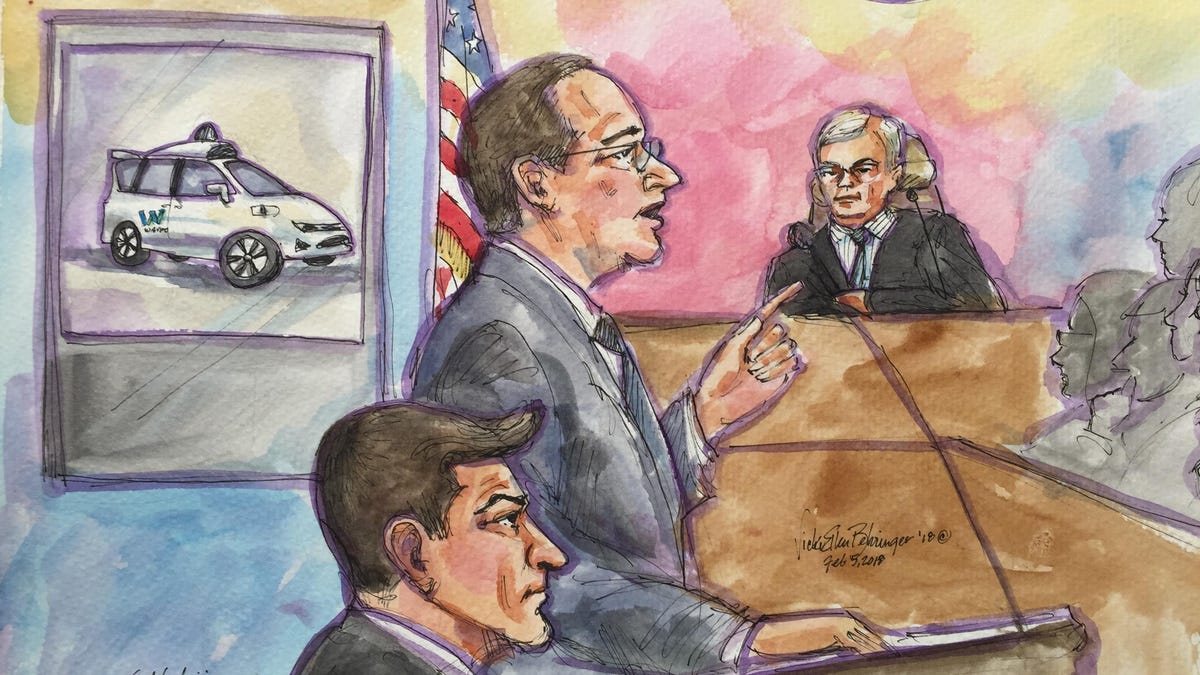Waymo v. Uber trial over trade secrets ends in settlement
The courtroom battle over whether Uber stole technology related to self-driving cars comes to an abrupt end on Friday morning.

Waymo's lawyer Charles Voehoeven addresses the jury during the Waymo v. Uber trial, which came to an end Friday morning after he announced a settlement had been reached.
Talk about your abrupt endings.
The trial between Uber and Alphabet's self-driving car spinoff, Waymo, came to a sudden end on Friday when Waymo's lawyer told the judge the companies had reached an out-of-court settlement. It was to have been the fifth day of the trial, which had been expected to last at least three weeks.
Waymo had sued Uber last year, alleging the ride-hailing company had access to Waymo's trade secrets covering technologies needed to build autonomous cars.
As part of the settlement, Waymo gets 0.34 percent of Uber's equity. Given Uber's current valuation of $72 billion, that translates to about $245 million, according to sources familiar with the negotiations. Uber also agreed to not incorporate Waymo's confidential information into its hardware and software.
The settlement brings to a close one of the juiciest court battles in Silicon Valley history, drawing in high-profile figures like former Uber CEO Travis Kalanick and early Uber investor Bill Gurley, of Benchmark Capital. Google co-founders Larry Page and Sergey Brin were also expected to testify.
The trial had already aired some of Uber's dirty laundry, including meeting notes quoting Kalanick saying, "The golden time is over. It's war time" regarding Uber's rivalry with Google, as well as a wish list that read: "source, all of their data, Tagging, road map, pound of flesh, IP."
At the heart of the dispute is one of tech's hottest trends: self-driving cars. Google started its autonomous vehicle program in 2009, investing about $1.1 billion developing hardware and software, according to depositions ahead of the trial. Kalanick saw the technology as a critical competitive advantage.
The case centered on Google's former star engineer, Anthony Levandowski, who allegedly downloaded about 14,000 files from the company before quitting in January 2016 to form his own self-driving truck startup, Otto. Uber acquired Otto in August 2016 and made Levandowski head of its autonomous vehicle program.
Much of Levandowski's work revolved around Lidar, formally known as "light detection and ranging." Lidar is one of the main technologies used in both Waymo and Uber's self-driving cars and lets vehicles "see" their surroundings and detect traffic, pedestrians, bicyclists and other obstacles.
Over the trial's previous four days, witnesses testified about Uber's notoriously competitive tactics and, at both sides' urging, delved into the technical nitty-gritty of SVN servers, fiber lasers and Drobo hard drives. By the end of day four of testimony, though, neither side proved definitively if Uber did -- or didn't -- use any of the 14,000 confidential files Waymo alleges were stolen.
Which is why Friday's settlement was a surprise.
In a statement, Uber's CEO Dara Khosrowshahi said the company did "not believe that any trade secrets made their way from Waymo to Uber."
"To our friends at Alphabet: we are partners, you are an important investor in Uber, and we share a deep belief in the power of technology to change people's lives for the better," Khosrowshahi said. "Of course, we are also competitors."
A Waymo spokesman said in a statement that the company believes the agreement it made with Uber will protect its intellectual property now and into the future.
"We are committed to working with Uber to make sure that each company develops its own technology," he said. "This includes an agreement to ensure that any Waymo confidential information is not being incorporated in Uber Advanced Technologies Group hardware and software. We have always believed competition should be fueled by innovation in the labs and on the roads and we look forward to bringing fully self-driving cars to the world."
CNET Magazine: Check out a sample of the stories in CNET's newsstand edition.
Virtual reality 101: CNET tells you everything you need to know about VR.



